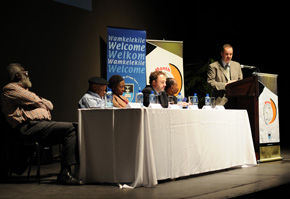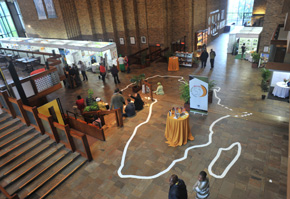Traditional and modern cultures can gel, say experts
28 May 2012 | Story by NewsroomIn a modern, fast-evolving '“ dare we say, westernised? '“ society, the place and relevance of African culture have constantly come under scrutiny, leading to debate and often sharply differing views.
 |
 |
| Panel on the beat: The panel discussion on the relevance of African culture drew a range of views. | On the map: UCT's Celebrating Africa Month came to a close '“ bar one event '“ last week. |
But the panel discussion on the African Culture, Human Rights and the Constitution, hosted on 24 May as part of the month-long Celebrating Africa Month at UCT '“ and the marquee event of the month '“ offered hope for consensus. Debating '“ and agreeing '“ were panellists Professor Salvatore Mancuso, chair of UCT's Centre for Comparative Law in Africa; Professor Pitika Ntuli, who chairs the Ministerial Advisory Committee on Indigenous Knowledge Systems for the Department of Science and Technology; Dr Sindiso Mnisi-Weeks, senior researcher in the Law, Race and Gender Research Unit; Professor Tom Zwart of the Netherlands School of Human Rights Research at Utrecht University in The Netherlands; and Professor Kwesi Prah, of the Cape Town-based Centre for Advanced Studies of African Society. Deputy vice-chancellor Professor Thandabantu Nhlapo chaired the discussion
Yes, some practices do clash with today's national constitutions and human rights decrees, but many others can fit comfortably within Africa's current democracies, the panellists agreed.
The event also coincided with an exhibition that highlighted the many fronts on which UCT departments and scholars tackle problems of the continent, and their many ties to other institutions and endeavours elsewhere in Africa. The panel discussion was followed immediately by a cocktail function; the launch of African Studies in the Post-Colonial University, the first title in the new Celebrating Africa Series and edited by Nhlapo and Professor Harry Garuba; the My Africa photographic competition; and the now traditional Africa dress competition.
The month and, especially, the exhibition and panel discussion had left him "aglow", Nhlapo reported at the closing of Africa Month a day later. "I think Africa Month has proven to us at UCT," he said, "not only that we can do this, but that we like doing it."
Yes, he pointed out, there were sceptics who had questioned the need for an Africa Month programme in an African university, but he remains unrepentant, he said. He likened the questioning of this kind of opportunity to the dismissal of the annual 16 Days of Activism against women abuse, arguing: "It's all well and good to say we should be doing these things every day, but what if we're not?"
Africa Month has provided the space for the UCT community to express itself on the question of the African identity, Nhlapo maintains. He adds that the level of participation in the month's activities had showed him that this is a space that has been eagerly awaited and that "UCT has a much more transformative instinct and soul than we sometimes give it credit for".
The closing ceremony also doubled as the launch of a new initiative with an Africa focus '“ the Curate Africa project of UCT's Centre for Curating the Archive. This initiative aims to create a collection of thousands of photographs, taken by people across Africa, which capture everyday life on the continent.
 This work is licensed under a Creative Commons Attribution-NoDerivatives 4.0 International License.
This work is licensed under a Creative Commons Attribution-NoDerivatives 4.0 International License.
Please view the republishing articles page for more information.










